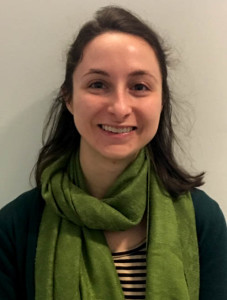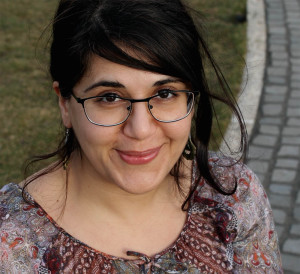SAS Recognizes “Best Conference Paper Award” Recipients for 2016
The Society for Armenian Studies is pleased to announce the recipients of its 2016 “Best Conference Paper Award.” Recognized are co-winners Jennifer Manoukian for her paper “Translating the Colloquial Armenian of Late-Nineteenth Century Constantinople in Zabel Yessayan’s The Gardens of Silihdar,” and Piruza Hayrapetyan for her paper “The Armenian Ganj-Hymn – An “Originally Armenian” or a “Borrowed” Genre: Reshaping the Debate.”
The SAS Executive Council will award each of the winning recipients a $500.00 prize. Each year SAS awards $500.00 for the best paper presented by a graduate student at a conference in a calendar year. A committee appointed by the Executive Council judges the papers.

Jennifer Manoukian
Manoukian’s paper was a critique of her translation of Zabel Yessayan’s The Gardens of Silihdar, which was written in Western Armenian and set in the 19th century Constantinople. The memoir is “interspersed with dialogue written in the sociolects of Yessayan’s family and neighbors, defined by code-switching between non-standard forms of Armenian and Turkish.” Manoukian’s critique explores the possible uses of The Gardens of Silihdar for sociolinguists, while also interrogating the position of translation for non-territorial, diasporan languages like Western Armenian.
Manoukian is a PhD student in the Department of Near Eastern Languages and Cultures at the University of California, Los Angeles and a literary translator from Western Armenian. She received her master’s degree from the Department of Middle Eastern, South Asian and African Studies at Columbia University and her bachelor’s degree from the Department of French at Rutgers University. Her book-length translations include The Gardens of Silihdar by Zabel Yessayan (2014) and The Candidate by Zareh Vorpouni (2016).

Piruza Hayrapetyan
Hayrapetyan delivered her paper at the 14th Graduate Student Colloquium in Armenian Studies (February 12, 2016, University of California, Los Angeles). Her paper dealt with Ganjs which are Armenian hymns dedicated to church feasts and saints. These were recited and sung in the Armenian Divine Office. In her paper Hayrapetyan poses the question of the “original and literary connection of the ganj into a wider literary context.” Her paper concentrated on two literary connections ganj – k‘aroz and ganj – Syriac hymns, madrashā and memrā. Based on a structural analysis of these genres, her paper “demonstrates the extent of the ganj’s literary dependence on these genres as a poetic form revealing both common and distinct structural features.”
Hayrapetyan received her B.A. (2005) and first M.A. (2007) degrees from the Yerevan State University Department of Armenian Philology. She is also a graduate of the Central European University (CEU) in Budapest where she received her second M.A. in Medieval Studies (2015). She is currently a doctoral candidate in the Department of Medieval Studies at CEU and an exchange fellow at the Department of Byzantine and Modern Greek Studies at the University of Vienna. She worked as a manuscript cataloger and junior codicologist at the Matenadaran (Research Institute of Armenian Manuscripts) in Yerevan (2008-2014).
SAS President Bedross Der Matossian congratulated both recipients. “This year we have received many highly-qualified papers in the competition which demonstrates the sophisticated level of a new generation of graduate students in their respective fields dealing with Armenian Studies. We hope that this trend continues for the coming years,” said Der Matossian.
The Society of Armenian Studies is an international body, composed of scholars and students, whose aims are to promote the study of Armenian culture and society, including history, language, literature, and social, political, and economic questions; to facilitate the exchange of scholarly information pertaining to Armenian studies around the world; and to sponsor panels and conferences on Armenian studies.
For membership information or more information on the Society for Armenian Studies, please visit the SAS website at societyforarmenianstudies.com.







